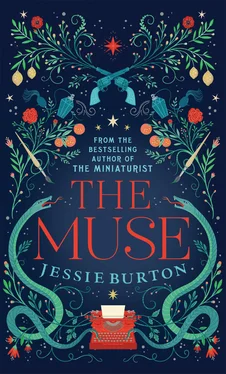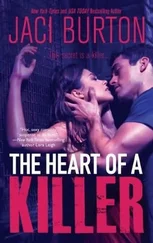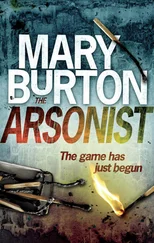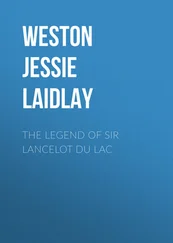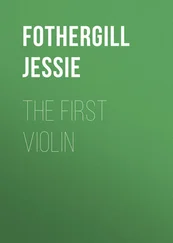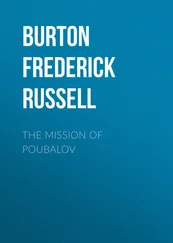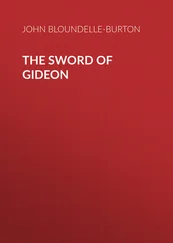‘That’s fair. But like Reede said, we don’t know enough about the painting yet. We need to go slowly. You don’t just happen upon a painting like that, Odelle. People always have something to hide. Listen to the words Mr Scott isn’t saying.’
‘Lawrie is an honest person,’ I said, my voice rising again.
‘Of course,’ Quick said, her own words tightening with emotion. ‘Of course he is. But you can still be honest at the same time as having something to hide. And if there is something to hide, then the Skelton could look very foolish indeed.’
She levered herself out of the chair and walked slowly into the cottage. I sat, stupefied, unable to think properly. What was going on here? The bees appeared to drone again, looping from flower to flower. Above, the sky was now cloudless. Suddenly everything seemed so very alive, vibrating, the green leaves turning slightly gold, moving in a psychedelic pattern as the sunshine rippled.
For a mad moment I imagined Quick might be fetching a revolver, that she was going to point it at me and demand answers that I couldn’t give. Something had switched rapidly over the brief course of our picnic, a change of energy like the light through the leaves, impossible to catch. But when Quick came back, she was holding a beautiful octavo leather notebook. ‘I bought this for you,’ she said, holding it out.
I could almost laugh, thinking about this scene now — no, it was not a firearm, but Quick knew full well it was still a weapon.
‘For me?’ I said.
‘Just a small present, to say thank you for doing such a wonderful job. I’m very glad we found you, Odelle. Or you found us, more to the point. Happy birthday.’
I took the notebook from her. It was hand-made, thick calfskin leather with a matte green finish. The pages were the colour of cream. It was a Stradivarius of notebooks, compared to the flimsy numbers I bought in Woolworth’s. ‘Thank you,’ I said. ‘It’s so kind.’
From somewhere over the fences, a lawn mower ground itself up to a mechanical whine, and a child shrieked. ‘Well,’ said Quick peaceably. ‘Don’t they always say? You never know when inspiration is going to strike.’
On Sunday, I sat on my bed with my new notebook from Quick, and thought about what she’d said in the garden. Like most artists, everything I produced was connected to who I was — and so I suffered according to how my work was received. The idea that anyone might be able to detach their personal value from their public output was revolutionary. I didn’t know if it was possible, even desirable. Surely it would affect the quality of the work?
Still, I knew I’d gone too far in the opposite direction, and something had to change. Ever since I could pick up a pen, other people’s pleasure was how I’d garnered attention and defined success. When I began receiving public acknowledgement for a private act, something was essentially lost. My writing became the axis upon which all my identity and happiness hinged. It was now outward-looking, a self-conscious performance. I was asked to repeat the pleasure for people, again and again, until the facsimile of my act became the act itself.
Cynth’s wedding poem was to me a perfect example of how I felt my writing to be bound up with obligation. I’d been writing for so long for the particular purpose of being approved that I’d forgotten the genesis of my impulse; unbothered, pure creation, existing outside the parameters of success and failure. And somewhere along the line, this being ‘good’ had come to paralyse my belief that I could write at all.
So admitting to Quick that I wanted to be published was no small step. It communicated, to a certain degree, that I believed I should be taken seriously. And here she was, telling me, Well, maybe you’re not that special, maybe you are — but that doesn’t actually mean anything, and it certainly doesn’t have any bearing on whether you can write. So stop worrying, and do it.
She had told me that the approval of other people should never be my goal; she had released me in a way I hadn’t been able to myself. She trusted me. Quick had encouraged me to lay myself bare, and it had not been that difficult at all.
I ran my fingers over the leather of the notebook and remembered. I first started writing as a little girl because I liked imagining parallel possibilities. That was all it was. That Sunday, I picked up my pen for the first time in a long time, and began to write.
*
At the end of the day on Monday — my actual birthday — I left a short story typed up on Quick’s desk. I wasn’t completely bullish — the top-grade schoolgirl dies hard — I did not creep into her office without a feeling of trepidation. I put no note on the top; she’d know who it was from.
I appreciated the irony that just like at school, at university, I was delivering a story for someone else to approve, but I had been too long inculcated with the act of writing for an audience. This time, however, I wasn’t going to hinge everything on my audience’s response. If Quick didn’t like it, maybe that was a good thing. It was now out of my control.
Pamela stopped me as I was leaving. ‘You can’t hide it any longer, you know,’ she said.
‘Sorry?’
‘Oh come on. You’re going round like Cupid smacked you in the chops. You forgot to put stamps on these envelopes. That ain’t like you.’
I winced; Pamela was more observant than perhaps I’d given her credit for. ‘I don’t know what you mean,’ I said.
‘Odelle, I’m only gonna keep askin’. Gonna be your Scotland Yard. It’s you and that feller, isn’t it? There was barely five minutes between you when he turned up.’
I weighed up my options. Don’t tell Pamela, and suffer her interminable hypotheses, which, knowing her, would become more outlandish and indefatigable — or just tell her, and be done. ‘Maybe,’ I said.
‘Lawrie Scott, eh. Bit posh, ain’t he?’
‘How do you know his first name?’
She looked pleased with herself. ‘It’s right here, in the appointment book. Written by your own fair hand. Shall I draw a heart round it for you?’
‘Shut up.’
‘Does Quick know?’
‘Quick knows.’
‘How?’
‘Saw us kissing in the reception.’
‘Hoo-ee!’ Pamela whooped with laughter and I couldn’t help a smile; it was a thrilling admission. ‘Bloody hell , Odelle, I didn’t know you had it in you. She must like you, ’cos most girls woulda been out on their ear.’
‘Pamela, shut up .’
‘Ahh, you like him.’
‘Don’t be an idiot.’
‘All right, all right.’ Pamela put up her hands, and her ringed fingers glinted in the light. ‘I was like that when I first met Billy,’ she said. I suspected no two men were more different than Lawrie and Billy, but I let it pass. ‘It’s like you can’t breathe ,’ she said.
‘I can breathe perfectly well.’
She laughed. ‘Miss High and Mighty. Honestly, Odelle, are you sure you ain’t a secret African queen?’
‘I’m from Trinidad.’
‘Keep your knickers on. Or maybe not .’
‘ Pamela. ’
‘Come on,’ she whispered. ‘Have you done it yet?’
‘Mind your own business.’
She smirked. ‘That’ll be a no then. Get on with it, Odelle. You don’t know what you’re missing.’ She fished under the reception counter and placed a brown-paper bag before me. ‘Happy birthday,’ she beamed, mischief dancing in her black-kohled eyes.
I eyed it suspiciously. ‘What’s inside?’
‘Take a look, Miss Bastien.’
I lifted the edge of the paper. Inside were two strips of pills. ‘Are these —’
Читать дальше
